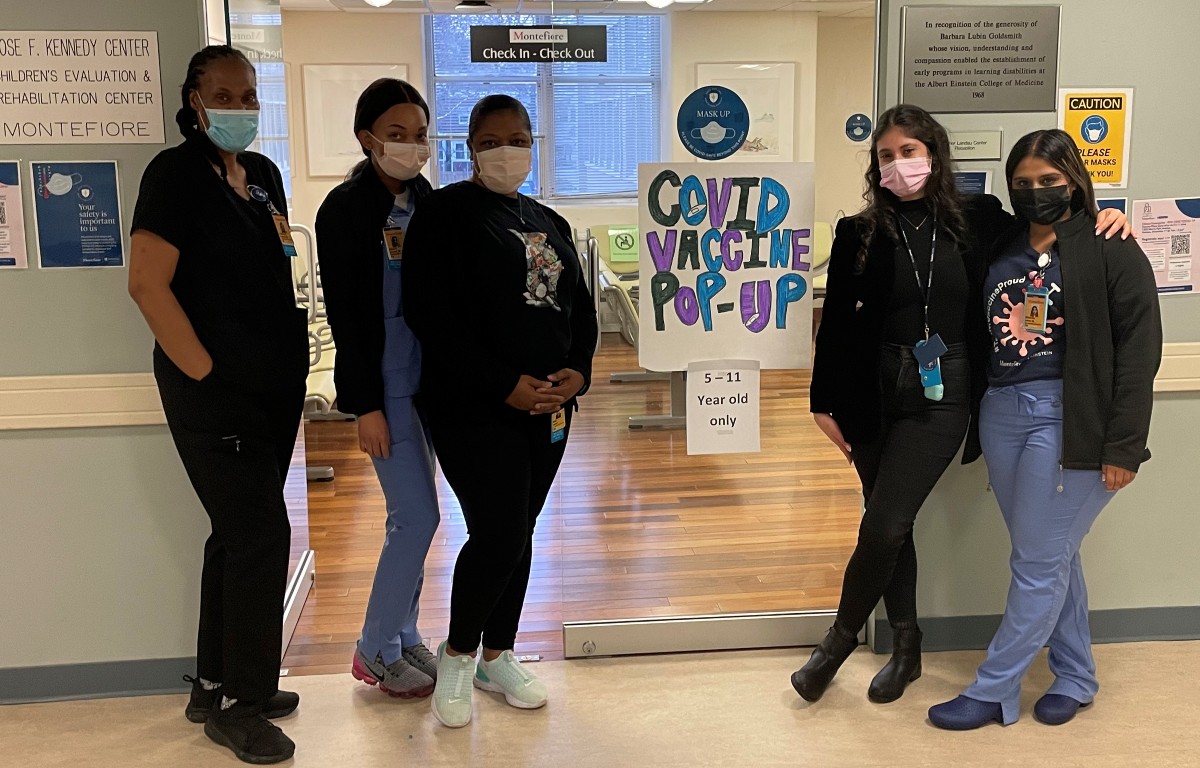
Vaccination staff in front of the RFK-CERC COVID-19 clinic for children with developmental disabilities.
On the morning of January 7, 2022, I woke up to a winter wonderland. I usually welcome snow—but on that day it inspired worry, not wonder. I am a first-year developmental-behavioral pediatrics fellow at Einstein’s Rose F. Kennedy Children’s Evaluation and Rehabilitation Center (RFK-CERC), where 32 of our 5- to 11-year-old patients with autism and other developmental disabilities were scheduled to receive their second COVID-19 vaccines.
The storm coincided with soaring cases of COVID-19 in New York City due to the Omicron variant. Our clinic is in the Bronx, the borough that, at the time, had both New York City’s lowest vaccination rate and its highest COVID-19 positivity rate. In addition, many parents of children with autism and other developmental disabilities are especially vaccine-hesitant due to long-disproved misinformation suggesting that autism is caused by vaccines. Further complicating the effort, people with developmental disabilities are at higher risk than other people for complications from COVID-19. The last thing we needed was yet another obstacle to getting our patients vaccinated. Talk about a “perfect storm”!
Sharing the VaxFacts
Getting our patients vaccinated has been a priority for us since vaccines for COVID-19 were first approved. This year our focus has been on overcoming parental hesitancy, along with meeting the actual challenge of getting shots into arms. Faculty members have given webinars on vaccination in several languages through RFK-CERC’s VaxFactsDDNY project. For many of our patients who have been followed at RFK-CERC since infancy, our clinicians are trusted sources of information; we have made a collective effort not only to recommend the vaccine to our patients, but to address their concerns and to provide vaccinations at the center.
In addition to parental vaccine hesitancy, there is the issue of physically accomplishing the task; many adults and children with autism and other developmental disabilities experience significant difficulty getting vaccinated in traditional centers due to their behavior. Issues such as having trouble communicating, sensory sensitivities, and behavioral challenges can all interfere with a successful procedure. At our vaccine clinic, many families said they felt comfortable knowing that their children would be vaccinated with clinicians present who were familiar with developmental disabilities and challenging behaviors.
The Team Approach to Vaccinations
Over the past six months, we ran two pop-up vaccination clinics for two days each: the first for the then newly eligible adolescents, and the second for youngsters ages 5 to 11. The clinics were staffed with nurses willing to be patient and flexible when a child on the autism spectrum took 15 minutes to transition into a room. They also vaccinated some children who were standing up (when this was deemed safe and was preferred by the children’s families), and were also willing to tolerate long negotiation periods between parents and children. Occupational therapists (who regularly treat some of the children being vaccinated) were on call at the clinic and provided sensory therapy, distraction, and comfort when needed. There were clinicians from our special-care dental clinic, and developmental-behavioral pediatricians (including me) to help parents safely stabilize their children and monitor behavior in the recovery area. We provided sensory toys and private postvaccine observation areas for those who were particularly active or agitated and could not safely be with a large group in an open area.
By the end of that snowy day, 28 of the 32 RFK-CERC patients with autism and developmental disabilities scheduled for vaccination that day had arrived and successfully completed their vaccination series. Parents were extremely grateful for the extra support. Members of one of those families had even tried to vaccinate their child at several other sites but had been unsuccessful each time—until coming to our vaccination clinic. Everyone erupted in applause when a team of four of us was finally able to vaccinate him. The inclement weather turned out to be no match for these determined parents, who were truly inspiring. Our vaccine clinics are a humble example of how, with commitment, planning, and a team approach, we can help our children with developmental disabilities successfully and non-traumatically get it done when it comes to medical procedures and care.

